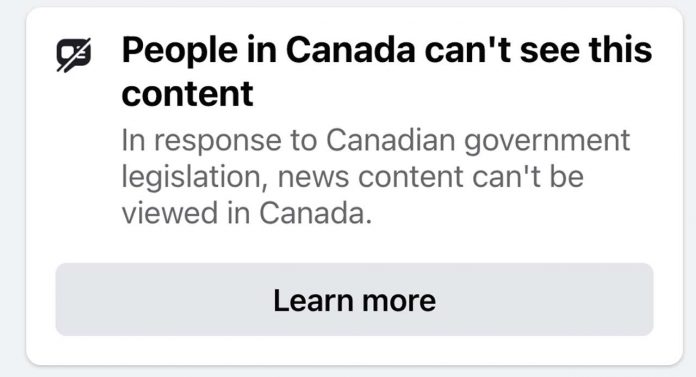OTTAWA – NEWS – In a high-stakes clash between technology giant Google and the federal government, News Media Canada, the representative body for some of the nation’s most prominent news organizations, has called upon Ottawa to accommodate Google’s specific apprehensions related to Bill C-18, the Online News Act.
With the legislation set to be enforced on December 19, a pressing deadline intensifies the showdown between Google and the Canadian government.
If you have wondered why there is no Canadian news on Facebook, it is because META the parent company of Facebook has removed the feature from its site. This has meant news outlets, including NetNewsLedger can not post links to news articles on our Facebook page. META has effectively shut down all Canadian news outlets from posting on their site as well as restricted Facebook users from sharing news links.
Legislation Modelled After Australia’s Law Aims to Balance Power Dynamics
Bill C-18, inspired by a similar law in Australia, is designed to incentivize major platforms such as Google and Facebook to establish licensing agreements with publishers. The legislation also encourages smaller publishers to engage in collective bargaining, addressing prevailing power imbalances within the industry.
Google Statement on Bill C-18
Google stated to the Canadian Government, “To this end, Google provides a wide array of products, partnerships and programs intended to support the news industry and a sustainable landscape for journalism.
“First and foremost, our products link people to Canadian news publishers’ websites, sending them valuable referral traffic they can monetize. In 2022, Google sent more than 3.6 billion visits to Canadian news publishers – at no charge – helping them make money with ads and new subscriptions.
“According to Deloitte, this traffic drove an estimated CAD$250 million worth of value each year. We offer tools such as Subscribe with Google and analytics products to enable publishers to easily convert users into paying subscribers, and underlying advertising technology to enable publishers to monetize their content. When publishers choose to use our advertising services, they reach more advertisers, and they keep a vast majority of the revenue that’s generated.
“We pay out billions of dollars a year directly to the publishing partners in our ad network. We also provide a variety of programs specific to news publishers. Google News Showcase – a content licensing program that pays publishers for curating certain news features in Google News and Discover – and includes over 150 Canadian publications.
“The Google News Initiative provides tools, training, and funding to help news organizations thrive in the digital age, including funding and support for innovation and equity projects, and extensive journalist training programs to strengthen digital skills in newsrooms. Taken together, these programs, partnerships, and products make Google one of the largest financial supporters of journalism in the world. We have also been clear about our desire to continue increasing our support to the Canadian News ecosystem. Unfortunately, while well intended, the Act is built upon a fundamentally flawed premise, yielding an unworkable framework and process that the Regulations unfortunately do not remedy – and in certain instances, exacerbate.”
Google adds, “First, Google does not appropriate news content: it provides links to news sites (along with headlines and short snippets to provide context) in the same way it links to any type of website, and refers users to the source. Inclusion in products like Google Search and Google News is entirely optional for news businesses, and we offer both an opt-out protocol and a variety of tools to help publishers manage what appears on our platforms. Most publishers do not opt-out because they find the free referral traffic they receive to be very valuable. In 2022, Google sent more than 3.6 billion visits to Canadian news publishers, driving an estimated CAD$250 million worth of value to publishers. Second, Google does not earn or seek to earn meaningful revenue from news. While news has tremendous social value, it is challenging to monetize, and this economic reality applies to Google just as it does news publishers. Specifically, while Google drives substantial traffic to news publishers, businesses prefer to advertise on Search queries that reflect interest in buying a product or service (whether shoes or vacations) rather than queries about breaking news. Furthermore, news represents a very small proportion of overall searches. In 2022, news queries accounted for less than 2% of Search queries in Canada, and were generally less monetizable than average queries. The revenue earned from clicks on the relatively small number of ads shown against those queries represented a small fraction of the value we provide to publishers in the form of referral traffic. Third, the reason news businesses are not compensated by platforms linking to their content is not due to a bargaining power imbalance, but because there has never been a “link tax” on the Internet, given that the value of linking is primarily to the publisher of the linked content. Free linking is the foundation of the open web, and it is not only permissible, it is essential to communication online.
“According to the Supreme Court of Canada, linking is “indispensable” to the “Internet’s capacity to disseminate information” and integral to online services like search engines, social media, communications services, and electronic newsletters. There is no bargaining because no one is compensated for merely providing links, headlines and short snippets; this is reflected in both domestic and international copyright law, which expressly guarantee a right to quotation (which is what allows journalists, news publishers, and others to quote or cite sources without triggering a payment obligation). If linking to content constitutes “appropriation,” why doesn’t the Act require everyone who links to pay the publisher to whom they are linking?”
and integral to online services like search engines, social media, communications services, and electronic newsletters. There is no bargaining because no one is compensated for merely providing links, headlines and short snippets; this is reflected in both domestic and international copyright law, which expressly guarantee a right to quotation (which is what allows journalists, news publishers, and others to quote or cite sources without triggering a payment obligation). If linking to content constitutes “appropriation,” why doesn’t the Act require everyone who links to pay the publisher to whom they are linking? By establishing linking to news sites as the basis for payment, the Act fails to recognize that the public’s ability to freely find and share links to news content online is critical to free expression, access to information, press freedom, and an informed citizenry.
Google: Putting a Price on Free Linking Not in Canadian’s Interest
“Put simply, it is foundational to how Canadians enjoy the free and open web. Putting a price on free linking to news content is not in the interest of Canadians, nor is it an effective response to the complex challenges facing the evolving Canadian news ecosystem. Furthermore, the Act created a regime that applies to at most two companies. With the withdrawal of Meta from linking to news content, it is now an Act aimed at a single company. We believe it is deeply discriminatory to require a single company to subsidize the costs of the Canadian news industry, especially as competing platforms will not be subject to the same obligations, and as many Canadian companies also benefit from a robust news sector. An Unworkable Process The Act compels Google (and now Google alone) to negotiate payment with certain publishers for merely “making news content available” (which includes linking to news sites), strips from Google the protection of internationally recognized and guaranteed copyright limitations and exceptions, and then imposes unfair, unworkable and unprecedented arbitration and exemption processes.
“This would radically change the legal landscape in which Google operates and put at risk our extensive investments into the Canadian news ecosystem. By legislating payment for links to news sites, and not defining what that price might be, the Act subjects Google to potentially unlimited financial liability for merely facilitating access to news sites and providing publishers with valuable referral traffic.
“Putting a price on free linking to news content clearly amounts to a link tax even if the tax is not expressed on a per link basis. Regrettably, the Regulations fail to provide a clearly defined limit on contributions or clarify that such contributions would not be tied to “making available” the news content of news businesses.
“The eligibility criteria for news businesses are vague, expansive and often inconsistent, allowing some businesses to benefit even if they do not produce news content or adhere to journalistic standards. Unfortunately, the Regulations fail to clarify the number and range of outlets that would require support or set clear eligibility criteria. Instead the Regulations expand the range of possible outlets that could demand compensation and do not require such outlets to adhere to a Code of Ethics”.
Google and Facebook Strongly Oppose the Legislation, Labeling it Unworkable
Google and Facebook have vehemently opposed the bill, labeling it as unfeasible. In a drastic move, Facebook has already removed Canadian news content from its platform to circumvent the legislation’s terms. Google, on the other hand, responded to the government’s draft regulations on Friday, highlighting a myriad of concerns. The company has announced its intention to withdraw Canadian news entirely unless the final regulations adequately address these issues. Google remains skeptical about the feasibility of resolving these concerns through regulation and has urged the government to draft an entirely new bill from scratch.
News Media Canada Stands Firm, Advocates Addressing Concerns in Final Regulations
News Media Canada, representing influential publishers including The Globe and Mail, the Toronto Star, Postmedia, and La Presse, stands in opposition to the notion of restarting the legislative process. Instead, the organization advocates for addressing Google’s concerns directly within the final version of the regulations.
Paul Deegan, President and CEO of News Media Canada Supports Google Direction
“Google’s submission is a welcome, clear, constructive, good faith articulation of legitimate concerns. We are in agreement with many of the issues they have raised,” stated Paul Deegan, President and CEO of News Media Canada, emphasizing the importance of integrating Google’s concerns in the final regulations.
As the deadline for the implementation of Bill C-18 rapidly approaches, the fate of Canadian news on major online platforms hangs in the balance, awaiting a resolution to the contentious standoff between the government and technology giants.
Stay tuned for further developments on this pivotal issue.







